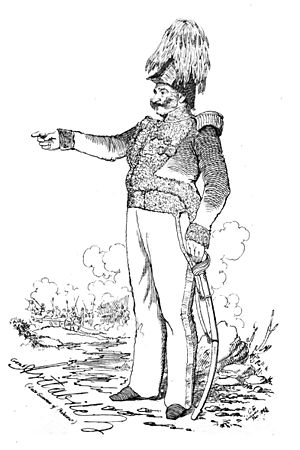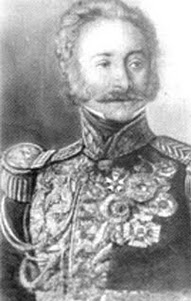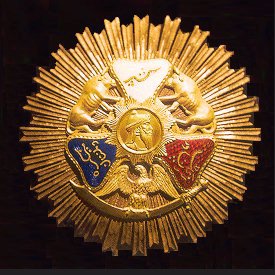Paolo Avitabile facts for kids
General Paolo Crescenzo Martino Avitabile (born October 25, 1791 – died March 28, 1850) was an Italian soldier and adventurer. He was born in a small town called Agerola in southern Italy. Paolo Avitabile became a soldier and worked for different rulers in various parts of the world, including Europe, Persia (modern-day Iran), and India. He was known for his bravery and his strict way of governing.
Quick facts for kids
Paolo Avitabile
|
|
|---|---|

Portrait by Colesworthy Grant
|
|
| Personal details | |
| Born | 25 October 1791 Agerola, Kingdom of Naples (present-day Campania, Italy) |
| Died | 28 March 1850 (aged 58) Agerola, Kingdom of the Two Sicilies (present-day Campania, Italy) |
| Awards | |
| Military service | |
| Allegiance | |
| Unit | |
Contents
Early Life and European Adventures
Paolo Avitabile started his military career in the Kingdom of Naples when he was young. Between 1807 and 1809, he joined the local army. Later, he became part of the regular army's artillery.
He fought in several wars under a general named Joachim Murat. During these battles, Avitabile became a Lieutenant. He also took command of the 15th Battery, a group of artillery soldiers.
After Napoleon's defeat, Naples was ruled by Ferdinand I. Avitabile kept his rank and joined the army of the new Kingdom of Two Sicilies. He showed great courage during a battle called the siege of Gaeta, where he was wounded twice.
Even though a general recommended him for a promotion, Avitabile was instead moved to a different position. He was disappointed by this and decided to leave the army. This marked the end of his military career in Europe.
Journey to Persia
After leaving the army in Naples, Avitabile decided to seek new opportunities abroad. He first thought about going to America, but his ship was wrecked near Marseille. Instead, he was advised to travel east.
In a city called Constantinople, he met someone who worked for the Persian Shah Fath Ali Shah. This agent was looking for European officers. In 1820, Avitabile joined the Persian Shah's army.
He worked for the Persian Shah for six years. During this time, he rose to the rank of colonel in the Persian army. He also met Claude August Court, another European officer who would later travel with him to India. Avitabile received high awards from Persia, but he felt the pay was not enough. When he heard good things about working in Punjab from Jean-Baptiste Ventura, he decided to travel further east.
Serving in Punjab
In 1827, Paolo Avitabile arrived in Lahore with his friend Claude Court. There, he was hired by Maharaja Ranjit Singh, the ruler of the Sikh Empire. Avitabile was given a job in the artillery. He was put in charge of the arsenal, which is where weapons are stored, and the gun foundries, where cannons are made.
He also received a civilian job as the governor of Wazirabad. He was a very good administrator, meaning he was skilled at managing the area. He held this position for seven years, and Wazirabad became a successful and thriving place under his rule.
Governor of Peshawar
In 1834, Avitabile was made governor of Peshawar. This area had been recently taken by the Maharaja from the Afghans. While his rule in Wazirabad was seen as fair and strict, his time as governor of Peshawar was known for being very tough.
Avitabile was determined to bring order to Peshawar. He used very strict methods to control crime and maintain peace. He became known as Abu Tabela in the area. His firm rule helped to establish order in a challenging region.
Even today, in Peshawar, some parents might mention "Abu Tabela" to encourage their children to behave. In times of trouble, some people still wish for a leader like Abu Tabela to bring back law and order.
His control of Peshawar was important during the First Anglo-Afghan War (1839–42). Avitabile helped the British army during this time. As governor of Peshawar, he controlled the southern entrance to the Khyber Pass, a very important mountain pass. He was ordered to help the British move through the pass into Afghanistan.
British officers who visited Peshawar were treated very well by Avitabile. Captain Havelock, a British officer, spent a month in Peshawar and wrote about the impressive court of Avitabile. He described Avitabile as a "frank, gay, and good-humoured person, as well as an excellent and skilful officer."
Avitabile was also a smart engineer and worked closely with a brilliant Sikh engineer named Lehna Singh Majithia. When the British returned in 1842, Avitabile's government gave them all possible help. This was because the Afghans had been enemies of the Sikhs for a long time. Avitabile remained governor until 1843, when he decided to retire and return home.
Return to Italy
Paolo Avitabile was one of the few European adventurers who managed to become wealthy and return home safely. He went back to Naples, Italy, and built a large house in his hometown of San Lazzaro, Agerola. He died in 1850, not long after marrying a local woman named Enrichetta Coccia.
In Fiction
Paolo Avitabile appears as a small character in the 1969 novel Flashman by George MacDonald Fraser. In the book, he is described as a "great, grey-bearded ox of a man." The story suggests that the Sikhs and Afghans were more afraid of him than of the Devil himself.
Awards and Recognition
Paolo Avitabile received many honors from the different countries he served. The list on his tomb in Agerola includes:
- Chevalier of the Legion of Honour (from France)
- Order of Merit of San Ferdinand of Naples (from the Kingdom of Naples)
- Order of the Durrani Empire Afghanistan (from Afghanistan)
- Grand Cordon of the Lion and the Sun (from Persia)
- Two Lions and Crown of Persia (from Persia)
- Auspicious Star of the Punjab (from the Sikh Empire)
See also
- Jean-Baptiste Ventura
- Fauj-i-Khas
 | Bayard Rustin |
 | Jeannette Carter |
 | Jeremiah A. Brown |



